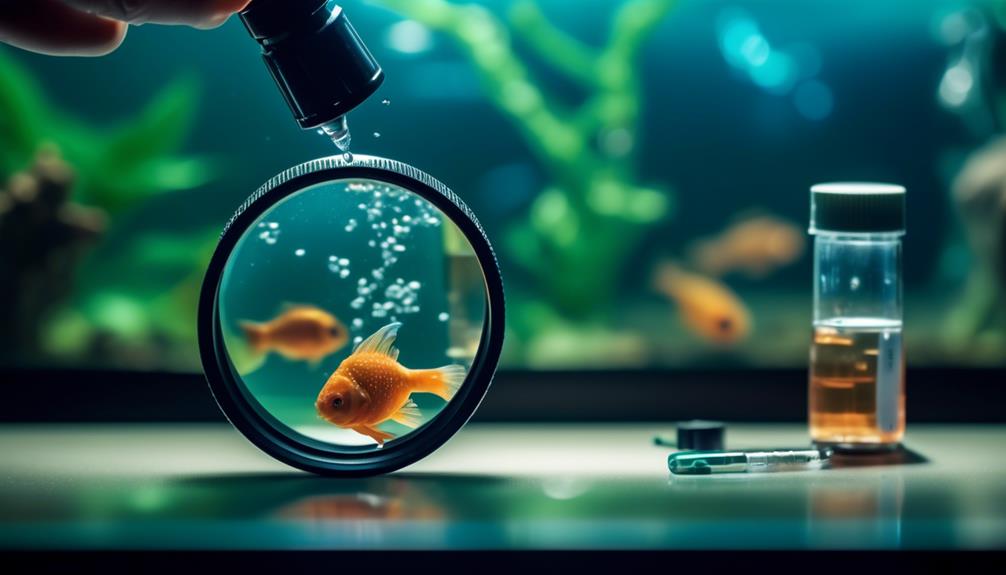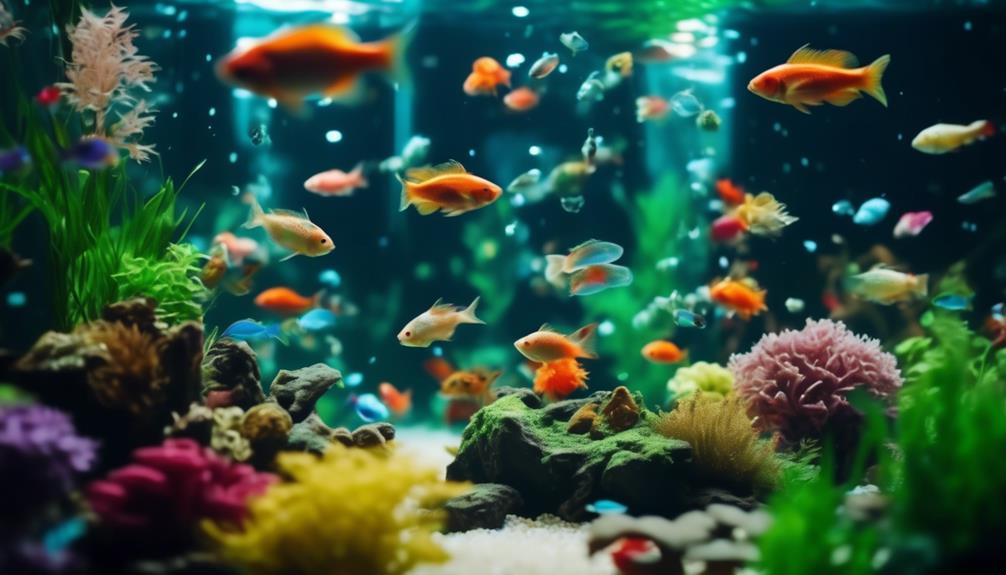Anyone with a fish tank knows how important it is to keep the water and environment just right, but sometimes fish get sick, and that can mess things up. If you look after fish, you should keep a keen eye out for any problems and know what to do if you spot something wrong.
Some of the links in this article may be affiliate links. If you make a purchase through these links, we may earn a small commission at no extra cost to you. Thank you.
This article is going to talk about the best ways to keep your tank clean, choose healthy fish, and feed them right to help prevent sickness.
First off, you need to watch your fish regularly to catch any issues early. If a fish starts acting weird or looks different, it might be sick. Quick action can stop the illness from getting worse or spreading. Keeping the water clean is super important. You should test it often and change it when needed to get rid of harmful stuff that can make fish sick.
When you pick new fish, you should learn about them first. Some fish are hardier than others, and knowing which ones can live well together can prevent stress and disease. Also, feeding your fish the right food is key. A balanced diet can boost their immune system. You can even find special foods for different kinds of fish.
If a fish does get sick, there are treatments you can use. For example, if your fish has a fungal infection, there are specific medicines you can add to the water. Always follow the instructions and maybe even ask a vet or an expert for advice.
Remember, keeping fish healthy is all about being observant, proactive, and ready to act. With these tips, you can help your underwater friends live a long and happy life.
Key Takeaways
To maintain the health of your fish, it's important to pay attention to water quality, select fish carefully, and watch for any signs of illness. Regular water testing is crucial to ensure the water is clean and safe, just like making sure the air we breathe is not polluted. A balanced diet is equally important for their overall health, as it prevents sickness and promotes vitality.
Think of it as being a guardian of their underwater world, constantly on the lookout for anything amiss. For example, by checking the water with a test kit each week, you can quickly spot any toxic substances. Offering your fish a mix of nutritious foods will keep them in top shape. By adhering to these practices, you're building a healthy and enjoyable environment for a variety of fish.
When selecting fish, it's smart to research or ask experts about which species can coexist peacefully and have similar care requirements. For instance, don't mix aggressive fish with more peaceful ones. Also, consider a high-quality filter to keep the water pristine and a heater to maintain the right temperature, which varies depending on the type of fish you have.
By being proactive and observant, you can enjoy the vibrant life that thrives within your aquarium.
Water Quality Management
Ensuring water quality is vital to keep fish healthy, and it starts with managing how many fish are in the pond or tank. Too many fish can cause too much waste, which can overwhelm the filter system and increase levels of harmful substances like ammonia and nitrites.
To help prevent this, it's important to regularly change some of the water. By removing some old water and adding in clean, treated water, you can lower the amount of unwanted pollutants. Use a product like a Pond Detoxifier to make sure chlorine, chloramines, and heavy metals don't poison your fish.
Also, make sure you aerate the water well. Aeration helps raise the level of oxygen in the water, which is good for the bacteria that help keep the water clean and makes a better environment for the fish.
For example, if you have a 100-gallon tank, you might remove and replace 20 gallons of water every week. When you add new water, treat it first with a Pond Detoxifier, such as API Pond Stress Coat, to make it safe for fish. And for aeration, consider using a device like the Tetra Whisper Air Pump, which can help increase oxygen and keep your water moving.
This combination of regular water changes, chemical treatment, and proper aeration will help ensure a thriving environment for your fish.
Responsible Buying Practices
Maintaining high-quality water is essential for fish health. It's just as important to buy your fish responsibly to avoid disease. When looking for fish, choose trusted sellers who take good care of their fish. Ask the seller how long they've had the fish and if they keep new fish separate for a while to check for sickness. This quarantine time helps catch and treat any diseases before they affect other fish.
It's also a good idea to ask the seller to keep the fish you want to buy a little longer after they get them to make sure they're healthy after their journey. Taking these steps helps prevent fish illnesses from the start.
Disease Monitoring Protocols

Monitoring your fish regularly is essential for spotting diseases early on, which makes treatment more likely to succeed. Here's how you can keep an eye on your fish's health effectively:
- Watch Your Fish Often: Make it a habit to observe your fish. Look out for any unusual behavior, like hiding more than usual or not swimming properly. Also, notice if they're not eating like they normally do.
- Examine Your Fish Closely: Take a good look at your fish often. Are there any unusual marks, like white spots or sores? Is their color looking off? These could be signs that something's wrong.
- Use Quarantine Tanks: When you get new fish or if any of your fish seem sick, keep them in a separate tank. This helps stop sickness from spreading to all your fish.
- Keep Detailed Records: Write down what you notice about your fish's behavior, the water quality, and any treatments you give them. This helps you see patterns and figure out what treatments work best.
For example, if you're introducing new fish, you could place them in a quarantine tank with a gentle filter and some hiding places to make them comfortable. For water quality, you might use a test kit that measures ammonia, nitrite, and pH levels. If you notice a fish is unwell, record the symptoms and any changes you make to their environment or diet. This way, you'll have a clear history to reference if you need to consult a vet or fish expert.
Let's keep the conversation going in a way that's easy to understand. By paying close attention to our fish and keeping good records, we can catch problems early and keep our underwater friends healthy.
Regular Water Testing
Testing the water regularly is very important for keeping fish healthy. It helps fish owners spot problems with the water early on, which can stop the fish from getting sick. To do this well, you need to check the water for things like ammonia, which is bad for fish, as well as nitrates, pH levels, and how hard the water is. You can use a water testing kit to check these. You might do the tests yourself or get help from a pet store.
If you find anything wrong, like too much ammonia in tap water, you should fix it quickly. You might need to change some of the water or use special chemicals to make it safe. Adding good bacteria to the water on a regular basis is another way to keep the water healthy for the fish.
For example, if you find that your tap water has high ammonia, you can use a product like Seachem Prime to make it safer for your fish. This is important because ammonia can poison fish and make them very sick. Regularly adding a beneficial bacteria supplement, such as API Quick Start, can also help keep your aquarium's ecosystem in good shape.
Nutritional Diet Essentials

Feeding your fish the right food is key to keeping them healthy and active. Each type of fish has its own dietary needs, so it's important to get food that matches what they would naturally eat. Look for quality food made with real, easy-to-digest ingredients like fish meal and spirulina, packed with vitamins.
Offer a variety of food types – think pellets, flakes, and some fresh or live options – to make sure your fish get all the nutrients they need. But remember, it's easy to give them too much. Just give them enough to eat in a couple of minutes to avoid polluting the tank and making them sick.
Feeding them properly helps prevent diseases and supports a well-balanced tank environment. For example, if you have tropical fish, you might choose high-protein flakes or pellets designed for tropical species. For bottom feeders, sinking pellets are a good choice. If you're unsure, ask at your local pet store or do a bit of research to find the best options for your aquatic pets.
Frequently Asked Questions
How Can I Identify and Manage Stress in My Pond Fish to Prevent Disease Onset?
To keep your pond fish healthy and stress-free, watch for changes in how they act, such as not moving much or swimming in a strange way. Make sure they have clean water, the right food, and a calm place to live. Here's why this matters: when fish are stressed, they can get sick easily. So, regularly check your pond's water for the right temperature and cleanliness. Feed your fish high-quality food that's made just for them. If you see any signs of stress, act quickly. You might need to adjust the water or give them a special treatment. Remember, happy fish are healthy fish!
For example, if you notice your fish are hiding a lot or not eating, test your pond water with a kit like the API Pond Master Test Kit. This test will help you keep an eye on water conditions. If you find a problem, fix it right away to help your fish feel better. It's also smart to add a pond aerator or a filter, such as the TetraPond Submersible Flat Box Filter, to keep the water moving and clean. This can really cut down on stress for your fish.
What Natural Remedies Can Be Used to Treat Common Fish Diseases Without Affecting Pond Ecology?
To manage fish diseases naturally, you can use herbal products like Pimafix and Melafix. These remedies are good for treating bacterial issues in fish and help their wounds heal. They're safe for your pond's environment if you follow the directions on the bottle.
It's important to treat fish diseases carefully because a healthy pond means healthy fish. Using natural options like these helps maintain the balance of life in your pond. For instance, Pimafix comes from the West Indian Bay Tree, and it's known for fighting fungus and bacteria. Melafix is made from tea tree oil, which is a gentle way to heal bacterial infections, repair damaged fins, ulcers, and open wounds.
To keep everything flowing smoothly in your pond, always use treatments as the maker suggests. This way, you make sure your pond's inhabitants and plants stay safe and sound. Remember, healthy fish make for a vibrant and thriving pond, and using the right treatments helps you achieve that without any nasty side effects.
How Do Seasonal Changes Affect Pond Fish Health, and What Adjustments Should I Make to Their Care Routine?
Changes in the weather can make pond fish unwell. To help them, you need to do a few things differently. When it gets colder or warmer, feed them the right amount for the temperature, make sure there's plenty of oxygen in the water, and check the water quality regularly to keep it just right. This helps because fish eat differently when the temperature changes, they need enough oxygen to breathe, and clean water keeps them healthy.
For example, in the winter, fish slow down and eat less, so you should feed them less. They might even stop eating when it's very cold. In the summer, they're more active and need more food. Always use a thermometer to check the water temperature and adjust their food accordingly.
To make sure they have enough oxygen, especially in the summer when the water gets warm and holds less oxygen, add an air pump or fountain to the pond. This keeps the water moving and adds oxygen, which is like making sure they have fresh air.
Checking the water means looking at things like pH and ammonia levels with a test kit. If these are wrong, it can hurt your fish. So, testing the water lets you fix any problems before they get sick.
If you're not sure what products to use, a good quality fish food labeled for the season, a reliable pond thermometer, an efficient aeration system, and a comprehensive water test kit are essential.
Can You Explain the Role of Beneficial Plants in a Pond Ecosystem for Maintaining Fish Health?
Beneficial plants are very important in a pond because they help keep the water healthy for fish. These plants give off oxygen, which fish need to breathe. They also help clean the water by taking in nutrients that could otherwise lead to too much algae. Plus, plants offer a place for fish to hide and find food, which is good for their well-being.
Here's a more detailed look at why these plants are so helpful:
- Oxygen production: Just like humans need air, fish need oxygen in the water to live. Plants like water lilies and hornwort release oxygen into the water during the day, which is especially important in a pond where fish are living.
- Natural filtration: Plants act like a filter in the water. They soak up things like nitrogen and phosphorus. Without plants, these substances can make algae grow too much, which can hurt the fish.
- A place to live: Plants give fish a place to hide from predators and bad weather. They also create spots where fish can lay their eggs safely.
For example, consider adding some floating plants, like duckweed or water lettuce, to your pond. These are not only great for providing shade and oxygen, but they also help reduce algae growth. Submerged plants, such as elodea or anacharis, can be good for adding oxygen and giving fish a place to hide.
Remember to use plants that are right for your pond size and climate. And keep an eye on them to make sure they don't take over the whole pond, because balance is key to a healthy pond ecosystem.
What Are the Long-Term Impacts of Overfeeding on Fish Health and Pond Water Quality, and How Can I Create an Effective Feeding Schedule to Avoid This?
Feeding fish too much can cause problems like dirty water and sick fish, because they create more waste than usual. This can make them very fat and hurt their insides. To avoid this, it's good to have a feeding plan that fits what each type of fish needs.
Here's why it's important: when fish are overfed, the uneaten food and extra fish poop can make the water toxic, which can harm the fish and even kill them if it gets really bad. Plus, fish that eat too much can become obese, just like humans, leading to liver problems and other serious health issues.
To keep your fish happy and your pond clean, here's a tip: watch how much your fish eat in a few minutes. Only give them enough food that they can finish quickly, usually within five minutes. This will change depending on what fish you have, so find out the right amount for your specific fish.
For example, if you're feeding koi in your pond, they need a balanced diet that could include a high-quality pellet food designed for koi. Feed them two to three times a day during the warmer months when they're more active, and less or not at all when the water is cold, as their metabolism slows down.
Conclusion
To keep fish healthy, it's essential to focus on three key areas: water quality, careful selection of fish, and staying alert for any signs of disease. Consistently testing the water ensures that it's safe and clean for fish to live in. A well-chosen diet is also crucial for their well-being. These steps are vital for stopping fish from getting sick and helping them to thrive.
It's like being a detective, always looking for clues to make sure everything is okay in the tank. For instance, using a water test kit weekly can show if there are any harmful chemicals present, and feeding fish a variety of foods keeps them strong. By following these tips, you create a happy home for all kinds of fish.

